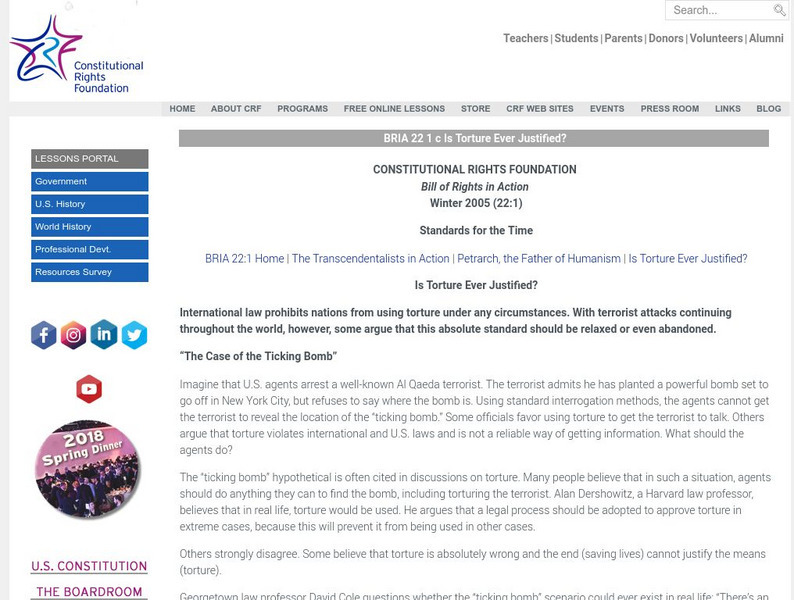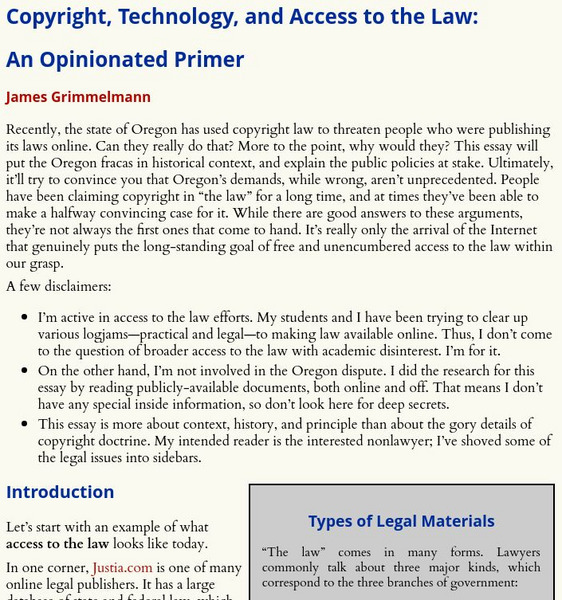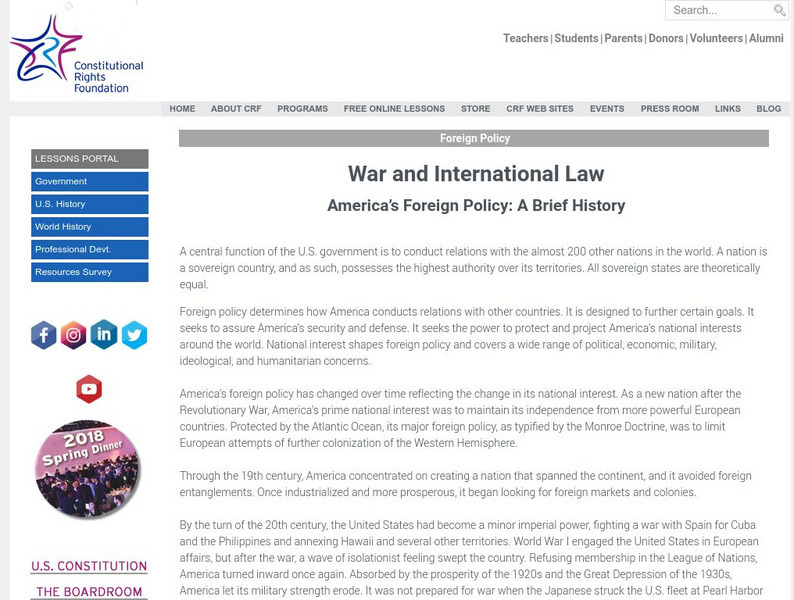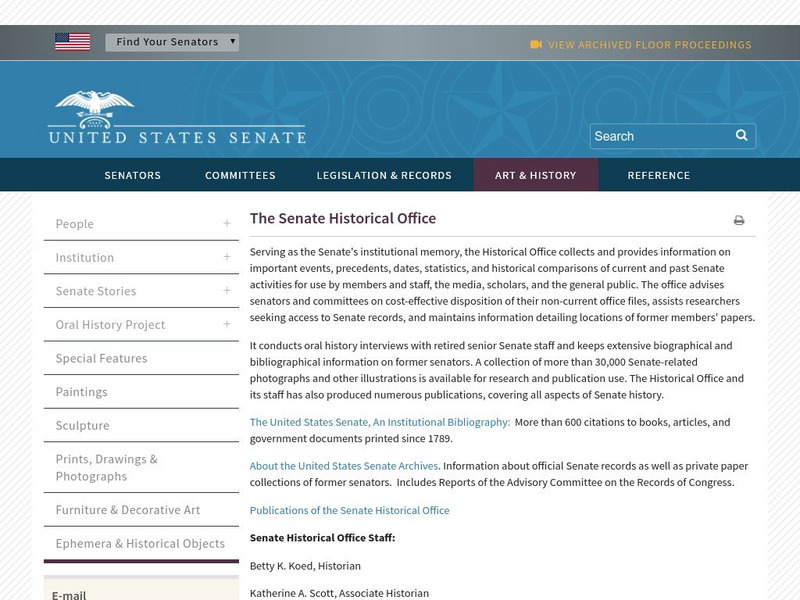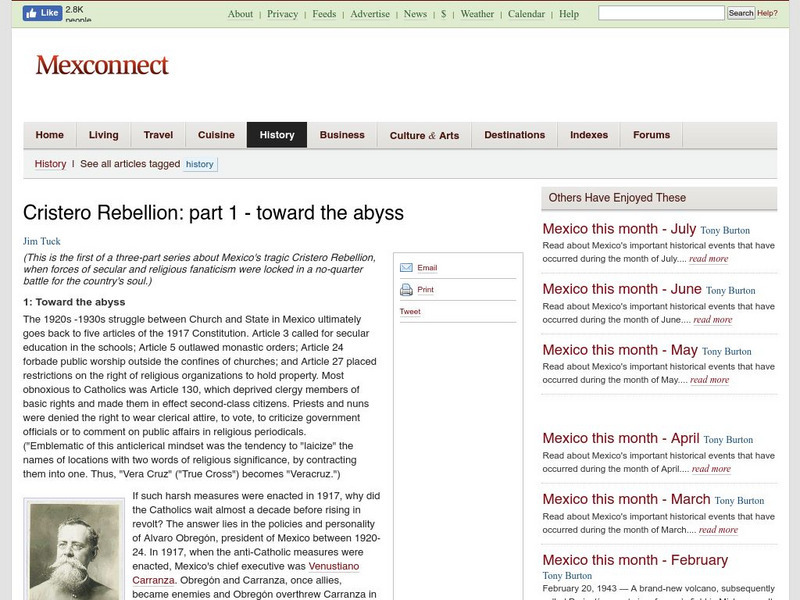Thomson Reuters
Find Law: u.s. Constitution: Article I, Section 6
This resource presents section 6 of article 1 of the U.S. Constitution, which details the rights and disabilities of members of Congress. The site discusses congressional pay, and privileges from arrest and of speech or debate in an...
Constitutional Rights Foundation
Constitutional Rights Foundation: St. Thomas Aquinas, Natural Law, and the Common Good
Learning activity in which students survey the philosophy of St. Thomas Aquinas and his ideas on government, natural law, and the common good to create policies or programs the U.S. government could enact. Questions for discussion and...
Cornell University
Cornell University: Law School: Equal Protection Overview
A brief overview of the Equal Protection Clause of the 14th Amendment. Includes a link to the full text of the amendment. Discusses equal protection.
University of Oklahoma
University of Oklahoma College of Law: The Annapolis Convention
Historical document reveals details of the Annapolis Convention, a national political convention held in 1786 Annapolis, Maryland, in which twelve delegates from five states gathered to discuss and develop a consensus about reversing the...
Thomson Reuters
Find Law: Annotation 6: Fourth Amendment: The Exclusionary Rule
This resource offers a discussion of the Fourth Amendment, and what has become known as the Exclusionary Rule. Provided on the bottom of the page are footnotes which can be reached by clicking on the links throughout the body of the text.
Thomson Reuters
Find Law: Annotation 3: Eighth Amendment
This particular page of annotations on the Eighth Amendment discusses the background and intended meaning of the phrase "cruel and unsual punishment".
Constitutional Rights Foundation
Constitutional Rights Foundation: A Brief History of Jim Crow
Article provides an overview of the history of Jim Crow laws and questions for discussion.
Constitutional Rights Foundation
Constitutional Rights Foundation: Is Torture Ever Justified?
Activity for students promoting a critical analysis and relevant discussion on whether torture is ever justified. Students are presented with the literature on U.S. law and international law on torture as well as Bush administration...
Wikimedia
Wikipedia: Nineteenth Amendment to the United States Constitution
Learn about the 19th Amendment to the United States Constitution. It guarantees that a person cannot be denied the right to vote based on their gender. Includes discussion of Susan B. Anthony's and Elizabeth Cady Stanton's contributions...
Constitutional Rights Foundation
Constitutional Rights Foundation: The Great Qing Code: Law and Order During China's Last Dynasty [Pdf]
Article and lesson on the evolution of Chinese law and order which reached its pinnacle during the Qing Dynasty. Includes article, map, primary source exceprt, and questions for discussion. In addition, students learn about the Qing Code...
Lectric Law Library
The 'Lectric Law Library's Lexicon: Eighth Amendment
This definition page at 'Lectric Library discusses the definition in the context of significant Supreme Court cases.
Constitutional Rights Foundation
Constitutional Rights Foundation: When Roman Law Ruled the Western World
A history of Roman law, culture and the development of Western European law codes. Includes questions for writing and discussion, small group activity and links to further reading.
Constitutional Rights Foundation
Constitutional Rights Foundation: The Origins of Islamic Law
Learn how Islamic law developed over time. The development of the sharia, or traditional Islamic law is explored as nomadic tribes began to progress into a more stabilized Muslim Empire. Family law and criminal law is discussed because...
Thomson Reuters
Find Law: Article V: Judicial Review
A discussion of the proposition that ratification of constitutional amendments is exclusively within the purview of Congress, either because of commitment or because the courts lack basic criteria of determination to pass on them.
Other
James Grimmerlmann: Copyright, Technology, and Access to the Law
Articles on technology and access to the law. The author discusses some innovative features of the Code from a legal standpoint, such as the number index system and the stele used to inscribe the laws.
Constitutional Rights Foundation
Constitutional Rights Foundation: War and International Law: America's Foreign Policy: A Brief History
Explore the history of foreign policy in the United States from the nineteenth century through to the present. Identify what values and principles have helped its formation over the years. Includes discussion questions.
Thomson Reuters
Find Law: History of the Constitution
This history of the American Constitution discusses how the Constitution served as a basis for inspiring and regulating laws made across the nation.
Constitutional Rights Foundation
Constitutional Rights Foundation: City Youth Unit: Crime Prevention [Pdf]
This unit is focused on helping students understand resources for solving and preventing crime. They compare crime prevention methods of today and in the past, take part in simulation exercises, and participate in a service learning...
Thomson Reuters
Find Law: Article I: Habeas Corpus Suspension
This resource discusses Article I of the U.S. Constitution and the suspension of Habeas Corpus during the Civil War. The links throughout the text lead to the footnotes at the bottom of the page.
Yale University
Papers of Dr. James Mc Henry on Federal Convention
A complete transcript of James McHenry's account of the Constitutional Convention on May 14, 1787. McHenry discusses the Virginia Plan.
US Senate
Explore the Senate's Past
Covers the workings of the Senate and how it evolved, and includes exhibits of historical photos and paintings. The Oral History section has interviews with people who worked in the Senate, where they discuss their careers and the...
Thomson Reuters
Find Law: u.s. Constitution: Article Iii: Annotations
This resource discusses both the original jurisdiction of the Supreme Court and the appellate jurisdiction of the lower federal courts. There are hypertext links to related materials.
University of Groningen
American History: Outlines: Human Nature, Government and Individual Rights
Overview discussion of the views held by Madison and Hamilton that people, in general, need to have written into the law certain checks and balances to guard against abuse of power, protect individual rights and encompass a pluralistic...
Mex Connect
Mex Connect: History of Mexico: The Cristero Rebellion
This is an extensive article discussing the problems of church and state in the early 20th century Mexico. It talks about the constitution, Catholicism, government, and revolutions that occured over the issue.









